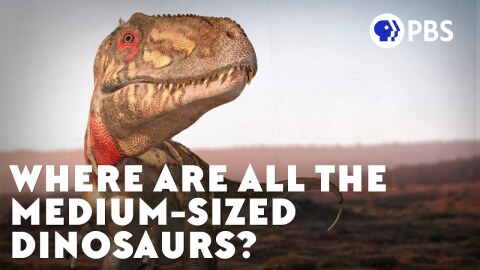-
The story of how the starfish got its arms reminds us that even animals that might be familiar to us today can have incredibly deep histories - ones that stretch back almost half a billion years.
-
The remains of medium-sized predatory dinosaurs are pretty rare in places where giant predators like T. rex existed. Which is weird, because that’s just not how ecosystems work today.
-
Weasels have an extreme body plan that may push the boundaries of what’s metabolically possible. So when and how did this happen? Why'd the weasels get so skinny?
-
420 million years ago, the forest floor of what's now New York was covered with a plant that didn’t look like a tree at all, except its roots were made of wood. Instead of looking up to learn about the evolution of trees, it turns out paleobotanists should’ve been looking down all along.
-
While dinosaurs were dominating the land, the metriorhynchids were thriving in the seas. But taking that plunge wasn’t easy because it takes a very special set of traits to fully dedicate yourself to life at sea.
-
Nunalleq, a village in what’s today southwest Alaska, seemed to have thrived during the Little Ice Age. How did this village manage to survive and prosper during this time period? And what caused this period of climate change in the first place?
-
Today, chilis are the most widely cultivated spice crop in the world - grown everywhere from their native home in the Americas to Europe, Africa, and Asia. But how and why did chilis evolve this weird, fiery trick in the first place? And why did we learn to love that spicy burn?
-
No other placental mammal that we know of prefers one side of the body so consistently, not even our closest primate relatives. But being right-handed may have deep evolutionary roots in our lineage. And yet, being a leftie does seem to come with some unexpected advantages.
-
Elongated tubes, flat ribbons, and other “worm-like” body plans were so varied and abundant that a part of the Ediacaran is sometimes known as Wormworld. But in the end, the ancient Wormworld was ended by the actions of its very own worms.
-
It's possible Euchambersia possessed venom about 20 million years before the first lizards and over 150 million years before the first snakes evolved. We’ve teamed up Sarah Suta from Bizarre Beasts to explore the story of venomous mammals, both living and extinct.
-
Our DNA holds thousands of dead genes and we’ve only just begun to unravel their stories. But one thing is already clear: we’re not just defined by the genes that we’ve gained over the course of our evolution, but also by the genes that we’ve lost along the way.
-
The biggest turtle ever described wasn’t an ancestor of today’s leatherback turtles or any other living sea turtles. But it looks like there are some things about being a giant, skin-shelled sea turtle that just work, no matter where, or when, you lived.

















